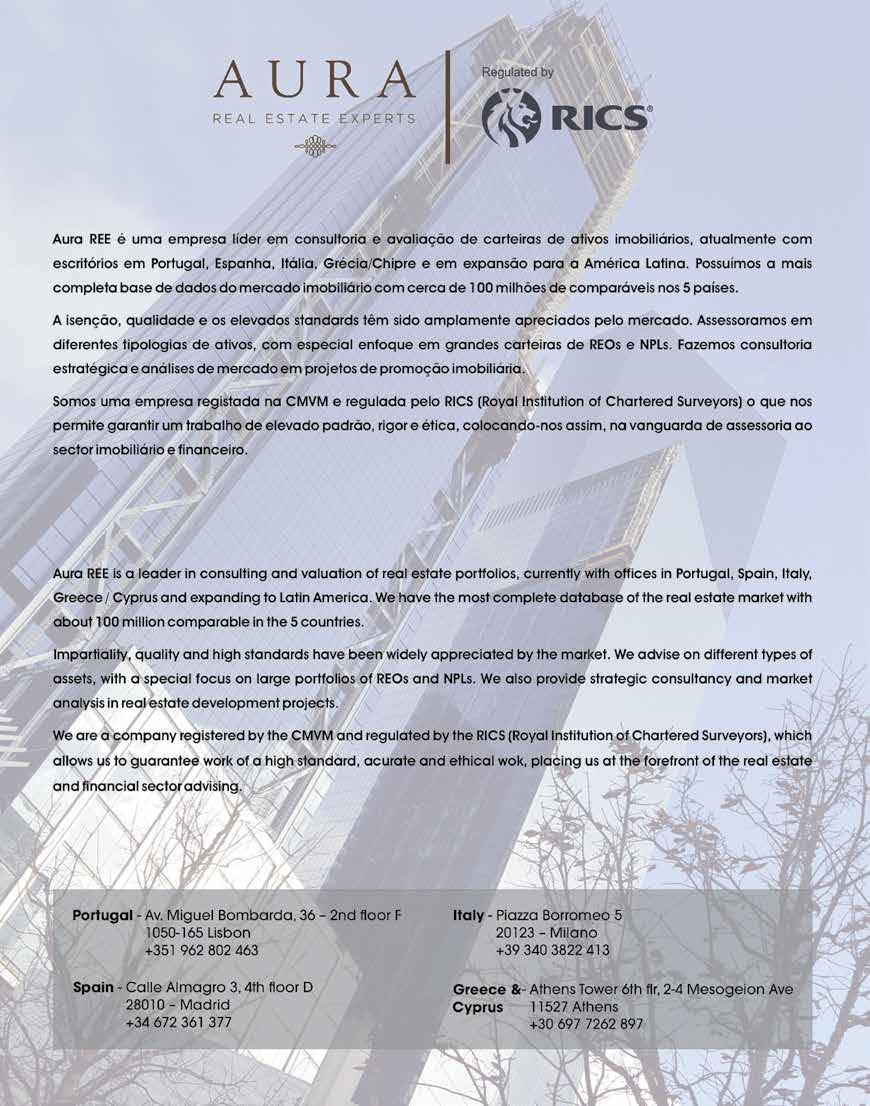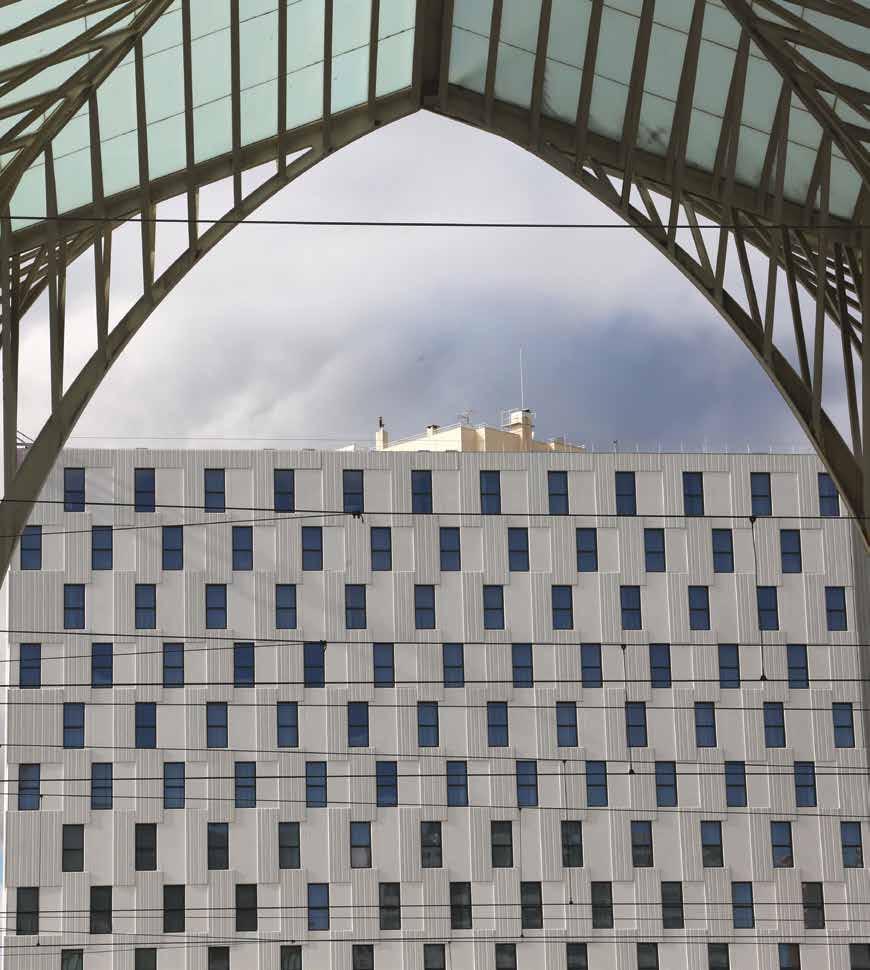
15 minute read
Sol & Lua
Tourism Sol e Lua56 Sol e Lua Tourism
Destemidos Fearless Sejam bem-vindos! Welcome!
Advertisement
No meio de tantas tabletas a dizer “fechado”, eis que se abrem novas portas para o conforto, para a fuga da realidade. Serão estes hoteleiros corajosos ou lunáticos? Amongst all the signs that say “Closed,” behold, new doors are opening for comfort, to escape reality. Are these hoteliers courageous geniuses or just crazy?
Texto Text: Carla Celestino Na altura em que escrevemos este artigo a Associação da Hotelaria de Portugal (AHP) revela o mais dramático cenário para o sector: 45% dos inquiridos no inquérito “flash” previam encerrar até ao final de 2020 e os grupos hoteleiros com várias unidades admitiam encerrar 56% dos seus estabelecimentos também no mesmo período. Em tempos de crise, ainda mais numa sem precedentes, há sempre quem não sobreviva. Mas também há quem seja timoneiro. Em plena pandemia foi inaugurado o hotel Moxy Lisboa Oriente promovido pela Krest Real Estate Investments e que terá a gestão do grupo Hoti Hoteis. É certo que ainda não abriu ao público mas o projecto não parou e concretizou-se. À semelhança deste, outras novas unidades hoteleiras concluíram também as suas obras no ano passado, tal foi o caso do Vila Galé Alter do Chão e Vila Galé Serra da Estrela, do Hotel Ivens 14 e Bairro Alto Hotel em Lisboa, do Mercure Porto Centro Aliados ou NEYA Porto Hotel na Invicta, do The Lodge Wine & Business Hotel em Vila Nova de Gaia, só para citar alguns. Mas houve também unidades que iniciaram a exploração hoteleira em plena crise pandémica, de que é exemplo o Hotel Campanile Caldas da Rainha pertencente ao Grupo Flagworld. Como foi isso possível? Porque o CEO Luís Roll acreditou que “apesar do momento difícil, o Turismo vai continuar a se desenvolver”. A isto acresce o facto de o grupo estar “permanentemente a adaptar-se mediante o mercado”, o que lhes tem permitido ser “cada vez mais ágeis na nossa gestão para fazer face às diferentes mudanças do mercado”. Esta agilidade, como destaca, “tem-nos ajudado a continuar o nosso projecto, desenvolvimento e a olhar o futuro como um novo desafio.” A operar em Portugal, Espanha e Cabo Verde, Luís Roll avança que, apesar do contexto restritivo derivado da pandemia de Covid-19, “temos todas as unidade abertas mas com uma clara diminuição da actividade” e “continuamos com o trabalho efectuado ao nível da gestão e adaptação dos recursos face à procura actual”. Esta estratégia permitiu ao grupo “limitar os prejuízos.” Na opinião de CEO do Grupo Flagworld, “os próximos meses vão constituir um grande desafio para o mercado nacional” mas também vão ser uma possibilidade de negócio. Como explica: “Vão surgir oportunidades no mercado nacional em hotéis localizados em todo o continente e ilhas, nomeadamente em hotéis com algumas dificuldades e que irão recorrer a grupos hoteleiros para os ajudar na comercialização e gestão”. Acrescentando

que é “aí, penso, que o Grupo Flagworld terá uma oportunidade de ajudar”, uma vez que “claramente é no mercado nacional que vejo o crescimento do Grupo.” Luís Roll reconhece que o sector sofreu em 2020 “uma forte quebra”, a qual deverá “prolongar-se até Outubro 2021”. Mas é um optimista e um beliver de que “após esse período assistiremos a uma recuperação lenta que se estenderá ao longo dos próximos anos.” Os especialistas mais positivos antecipam a recuperação do sector, defendendo que se até Maio a esmagadora maioria da população estiver vacinada os turistas vão chegar. Aliás, na sessão online da AHP, a presidente executiva Cristina Siza Vieira lançou o repto ao Turismo de Portugal para reforçar a imagem de Portugal junto dos principais mercados emissores turísticos, nomeadamente o Reino Unido e a Alemanha, salientando que essa campanha deve estar alinhada com os planos de vacinação dos respectivos mercados. Voltamos à questão inicial: Serão os hoteleiros em actividade arrojados ou insensatos? Acima de tudo são empresários muito experientes e com alguma escala que lhes permite atravessar tormentas sem recorrer a lay-offs ou subsídios. Não podemos, pois, deixar de os admirar por conseguirem concretizar os seus feitos no pior cenário alguma vez imaginado. São sem dúvida hoteleiros destemidos.
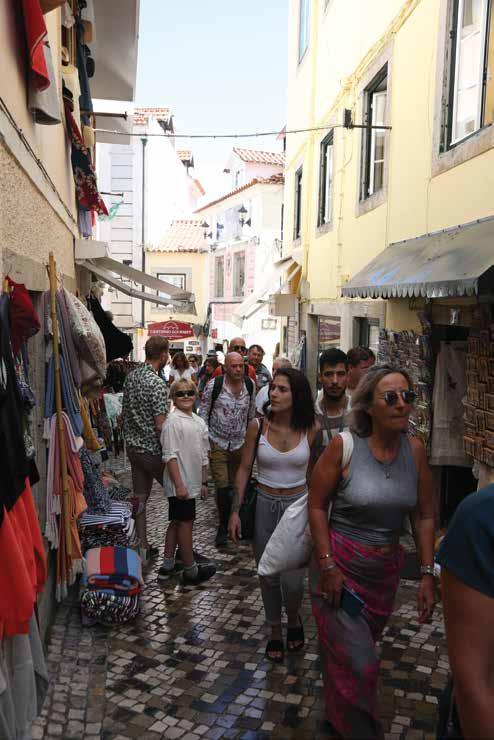

As this article is being written, the Hospitality Association of Portugal (AHP) is publishing some dramatic data for the industry: 45% of their “flash” survey participants expected to close by the end of 2020, and hotel groups that have several units in their portfolios admitted they would close 56% of their establishments during the same period. In times of crisis, even more so in such an unprecedented one, there are always those who don’t survive. But there are also those who are able to weather the storm. The Moxy Lisboa Oriente Hotel, developed by Krest Real Estate Investments and managed by Hoti Hotels, opened in the middle of the pandemic. While it hasn’t yet opened its doors to the public, the project has kept moving forward and become a reality. Similar to this one, other new hotels have also seen construction finish within the past year, such as the Vila Galé Alter do Chão; Vila Galé Serra da Estrela; Ivens 14 Hotel and EPIC SANA Marquês in Lisbon; the Mercure Porto Centre Aliados and the NEYA Porto Hotel in Porto; and
Apesar do momento difícil, o Turismo vai continuar a se desenvolver. Despite this difficult moment, the tourism industry will continue to develop and evolve.”


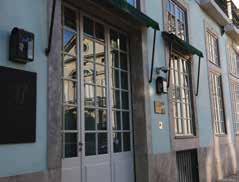
The Lodge Wine & Business Hotel in Vila Nova de Gaia, just to name a few. But there have also been hotels that have begun operating in the midst of the pandemic, such as the Hotel Campanile Caldas da Rainha, which belongs to the Flagworld Group. How has this been possible? It’s because CEO Luís Roll believed that, “despite this difficult moment, the tourism industry will continue to develop and evolve.” He also adds to this the fact that the group is “constantly adapting itself to the market,” which has allowed them to be “increasingly agile in how we manage our business in the face of different changes in the market.” This agility, Roll explains, “has been helping us continue with our projects, our development, and has even helped us look to the future as a new chal-

lenge.” Operating in Portugal, Spain, and Cabo Verde, Luís Roll says that, despite the restrictive environment brought about by the COVID-19 pandemic, “all of our units are open but have suffered a clear decrease in activity” and that “we are continuing with our work, managing and adapting our resources in view of current demand.” This strategy has allowed the group to “limit [its] losses.” The Flagworld Group CEO is of the opinion that “the coming months will be quite challenging for the domestic market,” but they will also be a business opportunity. Roll explains, “Opportunities in the domestic market will emerge in the form of hotels located throughout the continent and the islands, namely hotels that have had some difficulties recently. These hotels will ask hotel groups for help marketing and managing themselves. It is there, I believe, that the Flagworld Group will be able to help,” since “it is clearly in the domestic market that I see the most opportunity for the Group to grow.” Roll recognises that the industry has suffered “a heavy blow” in 2020, which may endure until October 2021.” But Roll is an optimist and a believer that, “after these trying times, we will see things recovering slowly, and this will extend over the next few years.” More positive experts anticipate that the industry will recover more quickly, arguing that, if the overwhelming majority of the population is vaccinated by May, tourists will come back. In fact, during an online session of the AHP, Executive President Cristina Siza Vieira challenged the National Tourism Agency of Portugal to reinforce the country’s image in the largest markets that send tourists to the country, namely the United Kingdom and Germany, stressing that this campaign must be aligned with the respective markets’ vaccination plans. Let’s go back to our initial question: are the hoteliers who are currently operating bold or foolish? They are, above all else, very experienced entrepreneurs whose businesses are the right size to have allowed them to weather this storm without resorting to layoffs or subsidies. So, all we can really do is look upon them with admiration for being able to achieve what they have in the worst scenario imaginable. Without a shadow of a doubt, it is safe to say that these hoteliers are fearless. Vão surgir oportunidades no mercado nacional em hotéis localizados em todo o continente e ilhas, nomeadamente em hotéis com algumas dificuldades e que irão recorrer a grupos hoteleiros para os ajudar na comercialização e gestão. Opportunities in the domestic market will emerge in the form of hotels located throughout the continent and the islands, namely hotels that have had some difficulties recently. These hotels will ask hotel groups for help marketing and managing themselves.”
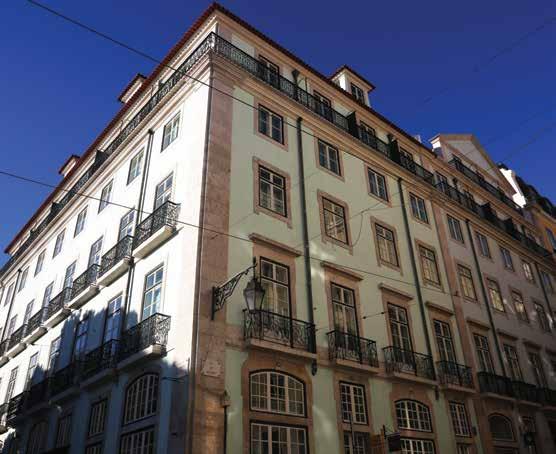

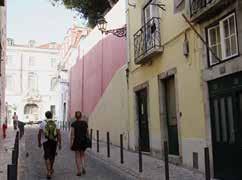
Lá fora Reino Unido Abroad United Kingdom
Roberto Varandas Perspectivas para 2021 Looking to 2021
Roberto Varandas
COS Capital Managing Director – Head of Europe A época natalícia proporcionou um período para reflectirmos sobre o ano que passou e para almejar uma conjuntura melhor em 2021. Ao longo do ano, tentei dar algumas perspectivas sobre a crise de saúde e da economia, os vencedores e perdedores nos mercados, a perspectiva da China, mas neste caso, vou deixar estes temas em 2020. Passadas as férias, proponho-vos algumas das tendências que vislumbro para os investidores imobiliários em 2021. Estes são alguns dos temas que suspeito virão à tona no próximo ano:
Mais capital para o Imobiliário
Recentemente, um terço da dívida considerada “investment grade” passou a linha das rentabilidades negativas, incluindo Portugal e Espanha, que recentemente, nas obrigações a 10 anos, passaram a render 0%. Associado à expansão massiva das respectivas políticas monetárias, muitos investidores questionam se o actual estado de coisas se poderá tornar hiper-inflacionário. Não só buscando o refúgio duma rentabilidade positiva, a exposição a activos reais, onde o imobiliário é o mais representativo, permite uma protecção a estes excessos monetários. Dependendo qual o relatório sobre os fluxos de capital mundiais que se consulta, os objectivos declarados de investidores institucionais sobre a sua exposição ao imobiliário situam-se entre os 10% e 14% do total dos activos, sendo que, alguns investidores buscam exposições de até 30% a 40%. Para gestores e operadores que procuram expandir os seus activos sob gestão, os ventos manter-se-ão favoráveis. Os retornos do imobiliário têm sido favoráveis aos investidores e, num contexto de retornos de 0% ou de retornos negativos, 5% a 6% é um patamar muito saudável. Embora as rentabilidades deverão sofrer no curto prazo, em particular em sectores como o retalho ou hotéis, rentabilidades modestas serão, ainda assim, melhores que as rentabilidades negativas da dívida.
Distress
As estratégias de distress normalmente levam, após a ocorrência de uma crise, dois a três anos a tornarem-se viáveis. Mesmo assim, devemos ver um aumento nas estratégias de distress. Provavelmente não NPLs ou REOCs numa primeira fase, antes, estratégias de reposicionamento do retalho e hotéis em dificuldades, já que são os activos mais prejudicados com os confinamentos. Os escritórios são um pouco mais resilientes devido a contratos mais longos e investidores que estão mais propensos a esperar por dias melhores.
Investimentos nos mercados domésticos
Seja devido a restrições nas viagens, seja devido ao aumento dos riscos geo-políticos, imaginados ou reais, investir além-fronteiras tornou-se uma tarefa ainda mais difícil. Muitos gestores beneficiam de equipas locais, mas a maioria dos investidores institucionais têm, na melhor das hipóteses, escritórios regionais. E se acharem que um investimento fora do mercado doméstico, não irá melhorar o perfil de risco versus retorno dos seus portfólios, leverá a um recuo do investimento para os mercados locais ao investidor. Não quero com isto afirmar que os investidores evitarão os mercados considerados “seguros” na América do Norte e na Europa, ou que deixarão os mercados em crescimento na Ásia ou América do Sul, mas muito provavelmente o farão através de gestores ou operadores especializados com os quais já tenham familiaridade.
Vou arriscar alguns outros temas para 2021:
• Crescimento do segmento residencial para arrendamento em mercados onde este sector não tem sido parte integrante das carteiras de investidores institucionais; • Uso mais intenso de tecnologia para gerir e monitorizar activos, assim como, casos sucesso do proptech; • Amálgama funcional do escritório e do escritó-
rio de casa, associado ao êxodo dos centros das cidades para os subúrbios ou para as pequenas cidades; • Transformação massiva do retalho, sendo que, as tendências do comércio electrónico continuam, mas as necessidades de lojas próximas do consumidor se manterão, embora num formato diferente. A questão será quais os bens e serviços que fornecerão?; • Impostos mais altos sobre o imobiliário - alguém tem que pagar os subsídios e os lay-offs que os governos têm concedido a empregados e empregadores. Desejo a todos os nossos leitores um próspero e saudável 2021!
The holiday season was an opportunity to look back to the year we are about to conclude and hope for generally better times in 2021. Over the year, I have tried to provide some perspective of the health crisis and the economic crisis, the winners and losers and the perspective from China, but I will not delve further on this very atypical year. With the holidays behind us, I would like to look at what I think will be some of the trends for institutional real estate investors for 2021. These are some of the themes I suspect will come to the forefront in the year to come:
Increasing flows to the asset class
Just recently, one third of the world’s investment grade debt moved into negative yield territory, including Portugal, followed by Spain, who’s 10-year bond went below a 0% yield. Associated with a fear of too much money being printed and where a precipice might be, where too much quantitative easing could turn hyperinflationary, institutional investors seek refuge in yielding, real assets of which real estate is the most prevalent. Average target real estate allocations for global institutional investors are somewhere between 10% and 14%, depending on the survey provider, with a number of mainstream, multi-asset investors targeting allocations as high as 30% to 40%. For managers and operators looking to expand their businesses, they will continue to have tailwinds supporting their efforts. Real estate returns have been strong and, in the context of 0% or negative returns, a 5%-6% return is very attractive. While returns are likely to suffer, in particular in sectors like retail and hospitality, even more modest overall returns will continue to be attractive.
Distressed strategies
While distressed strategies typically take 2-3 years to play out in the market after a crisis occurs, we should see an increase in strategies targeting very specific distress. Probably not NPLs or REOCs in an initial stage, more likely strategies targeting retail conversions or distressed hospitality assets, as the lockdowns take their toll on owners in these sectors. Offices are somewhat more resilient due to longer leases, and investors more willing to wait out the current downsizing of space requirements, in hope for better days ahead.
Home bias
Whether due to travel restrictions, or due to increased global geo-political risks, perceived or real, investing cross-border has become an even more difficult undertaking. Many managers are equipped with local teams and can surpass these complications but most end institutional investors have, at best, regional offices. And if they believe that international allocations will not enhance their overall riskreturn profile, I suspect there will be a slight retreat to home markets. Not to imply that investors will shun “safety” markets in North America and Europe, or, pursue growth markets in Asia or South America, but most likely will do so mostly through third party fund managers or operators with whom they already have familiarity.
A few other bullets I will chance for 2021:
• Continued growth of residential / multi-family in markets where this sector has not been mainstream. Investors will look to this diversified, stable strategy; • More intense use of technology to manage, report and monitor assets – emergence of proptech success stories; • Blurring of lines between the office, the home office – move out of the city centres to the suburbs or small towns; • Massive transformation of retail – e-commerce trends proceed but people will always require local shops. The question is what goods and services will they provide?; • Higher taxes on property – someone needs to pay the stimulus and furloughs/layoff subsidies governments everywhere have been handing out to employees and employers. I wish all our readers a prosperous and healthy 2021!
Joaquim Pereira de Almeida Sem dó nem piedade!

No mercy or compassion!
Meio mundo fala da vacina para Covid-19, outro não esconde os números assustadores que se agravam todas as semanas. Levantamos outra questão. A carga fiscal que se abate sobre as empresas. Sem dó nem piedade! Half the world is talking about the COVID-19 vaccine, while the other half is publishing frightening numbers that get worse by the week. We’d like to bring yet another matter to the fore: the tax burden that is falling on businesses. No mercy or compassion!

